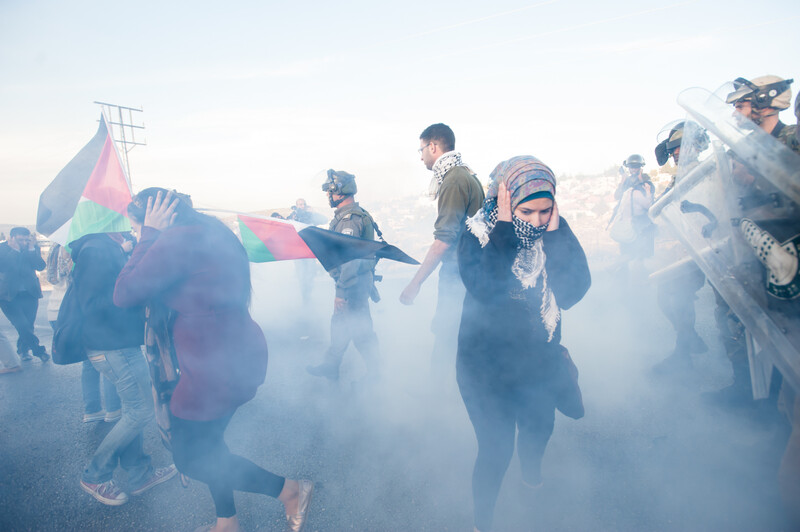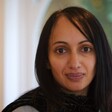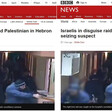Media Watch 5 December 2013

Protests in Jalazone, near Ramallah, against the planned uprooting of Palestinian Bedouins.
ActiveStillsThree days before last weekend’s international Day of Rage against Israel’s plans for the mass uprooting of Palestinian Bedouins, the BBC had in its studios a Bedouin activist from one of the communities facing destruction.
Amal Elsana al-Hajooj was interviewed for ten minutes on Woman’s Hour, on BBC Radio 4, by presenter Jenni Murray, about her community activism and struggle for equality. The next day, Thursday 28 November, al-Hajooj was interviewed again, this time for close to 13 minutes on the BBC World Service’s Outlook program.
But, despite the fact that global protests against the Prawer Plan — Israel’s planned ethnic cleansing of the Bedouin from the Naqab (Negev) desert — were due to take place a few days later, neither of the BBC programs thought it newsworthy to question al-Hajooj on the subject.
Both Woman’s Hour and Outlook managed to render invisible Israel’s planned forcible transfer of Palestinian Bedouins from their land even while interviewing one of the Bedouins directly affected. It was an extraordinary act of hiding Israel’s crimes, even by BBC standards.
Al-Hajooj was in London last week, explained Jenni Murray in her introduction, to receive “a humanitarian award” for her work with Bedouin women and for “furthering the cause of a shared society between Jews and Arabs.”
This was just one of many ironies in the interview that Murray seemed completely unaware of. As the Palestine Solidarity Campaign (PSC) pointed out in a subsequent letter to Woman’s Hour: “The Israeli state is destroying any hope of communities living together and is pursuing policies that will enforce segregation between Palestinian and Jewish citizens of Israel. To have questioned Amal about the state’s actions, to be enforced through the Prawer Plan, would have made the piece more realistic and more truthful. As it was, it came across as incredibly naive.”
Selective
The PSC’s letter continued: “Amongst the many questions asked of a Bedouin community activist, whose community that she seeks to serve is under very real threat of destruction by this plan, at least one question about it would have been entirely relevant.
“The omission of this part of the Negev Bedouins’ lives from the piece was an unfortunate example of the BBC’s selective reporting on Israel, which follows the policy of not broadcasting anything, if possible, that will reflect badly on the Israeli state.”
In fact, the Israeli state did not feature in the interview with al-Hajooj, even though she has regularly spoken out against its actions in the Naqab. In a newspaper report about a protest outside the Israeli prime minister’s office against the Prawer Plan in 2011, she is quoted as saying: “The government treats the Bedouin residents of the Negev from the security paradigm of a ‘demographic threat’ and … refuses to treat us like equal citizens.”
In an interview with the news agency IRIN the same year, she said: “[The Bedouins] have no claim to land. Their communities have no water, electricity or roads. There are no education or health services. The Negev is the backyard of the State of Israel. We are struggling to get any investment here.”
This aspect of her community activism and, indeed, of her life was not raised either by Murray in the Woman’s Hour interview or by presenter Matthew Bannister when he interviewed al-Hajooj the following day on Outlook.
Instead the questions focused on her role as a woman in a “patriarchal society where women are excluded” (al-Hajooj’s words, Woman’s Hour), thus concentrating solely on Bedouin men as oppressors and ignoring the overarching oppression of the Israeli state, which persecutes Palestinians regardless of gender.
Echoing Zionist propaganda
The remainder of both interviews examined al-Hajooj’s desire to create “shared space” between Palestinian and Jewish Israeli communities and the joint Arab-Jewish school she has founded in a bid to further this aim. Again, the fact that the Israeli state will take the land of the Bedouin and build Jewish-only settlements on it, while confining the Bedouins to their own townships, was not mentioned.
In fact, the only time the Israeli state was mentioned was in Murray’s Woman’s Hour introduction, when it was presented as a benign entity that, in 1972, had “allowed [al-Hajooj] and her family to return to their land in the Negev.” Listeners were not told that it was the creation of Israel in 1948 which had originally caused the expulsion of Palestinian Bedouins from the Naqab. To have enlightened the audience on this would, of course, have reflected badly on Israel.
And, not content with hiding Israel’s expulsion of Palestinians during the time of its creation, Murray actually went on to echo the old Zionist propaganda of that era.
Concluding her introduction, she turned her focus to al-Hajooj and said: “I remember the Negev as a barren, empty, rocky part of the country. How would you describe it now?”
“Barren, empty, rocky?” The words of the BBC presenter seem to almost mirror the Zionist mantra about Palestine before 1948 as being “a land without a people” and therefore ripe for settlement.
But just as Palestine was in no sense a land without a people, nor was the Negev (or Naqab, as it was known before the creation of Israel) ever empty. The Palestinian Bedouins have roamed the land since ancient times, and Palestine, before the ethnic cleansing between 1947 and 1949, was thriving with a population of 1.75 million Palestinians, a mixture of Muslims, Jews and Christians.
Yet how will BBC audiences ever know facts like these when BBC presenters such as Murray throw their own personal distortions into programs that are already a mix of half truths and hidden realities?
Three days after Murray’s interview and two days after Bannister’s broadcast, activists across the globe joined in solidarity with Palestinians in the occupied West Bank (including East Jerusalem), Gaza and within Israel to protest against the Prawer Plan in their own towns and cities.
For listeners who had heard a Bedouin activist from the Naqab being interviewed twice in the preceding days on the BBC, news of these demonstrations, and of the Prawer Plan, must have come as a complete surprise.






Comments
Leaked BBC document sheds light on its biased reporting
Permalink leonie replied on
More on BBC covering up Israeli brutality here (2010):
http://manchestermule.com/arti...
"Above the law: Why the BBC is a legitimate target for pro-Palestinian protests
.....The BBC has a guide for its journalists that provides background to the situation and advice about the type of language that should be used to describe events, which MULE has managed to obtain. An abbreviated version is available on the BBC website for the public. What is absent from the public version, however, is the stress placed on not referring to the legality of, well, anything, unless it is specifically attributed. Under the heading ‘ILLEGAL OCCUPATION’ is the instruction to “Be very careful indeed.”"
We need BBC whistleblowers!
Permalink Artemis replied on
Very interesting comment from leonie. I suspected something like this. I am also sure that there are people within the BBC, or who have left, who could tell us a great deal more about pressures they are subjected to when the subject of Palestine is raised.
We know, for instance that the BBC is bombarded by emails and calls whenever the slightest detail concerning Israeli oppression and occupation of Palestinin land is reported. We know that people in high places can easily have comments removed or programming altered if it displeases them. Ken Loach's comments were removed because of Baroness Deech, a Zionist - one complaint from her was enough. We know that the new head of the BBC, Danny Cohen, comes from a strong Zionist background (how he ever got this well-paid job is a big question, because the kind of programming he did previously would be more suited on commercial stations, not a government and publicly funded 'institution') and that several heads of departments were formerly Zionist apologists or lobbyists.
How much will it take before the British rise up in anger about the way Zionists abuse the BBC charter? This is just one example of abuse, I'm sure (and might well extend to other countries in the Middle East, which are depicted according to Israel's wishes), but a very particular one, because it mirrors the personal views and politics of the people running the BBC.
Amal Elsana al-Hajooj - BBC interviews
Permalink Mark Pickard replied on
Well, sadly, that is all too "BBC", but why didn't Amal Elsana al-Hajooj just proffer a realistic account of the situation of the Bedouin and outline the Prawer plan anyhow...'unbidden'! She must have known that she was going into the lions' den with the 'Beeb', and should really have been prepared.